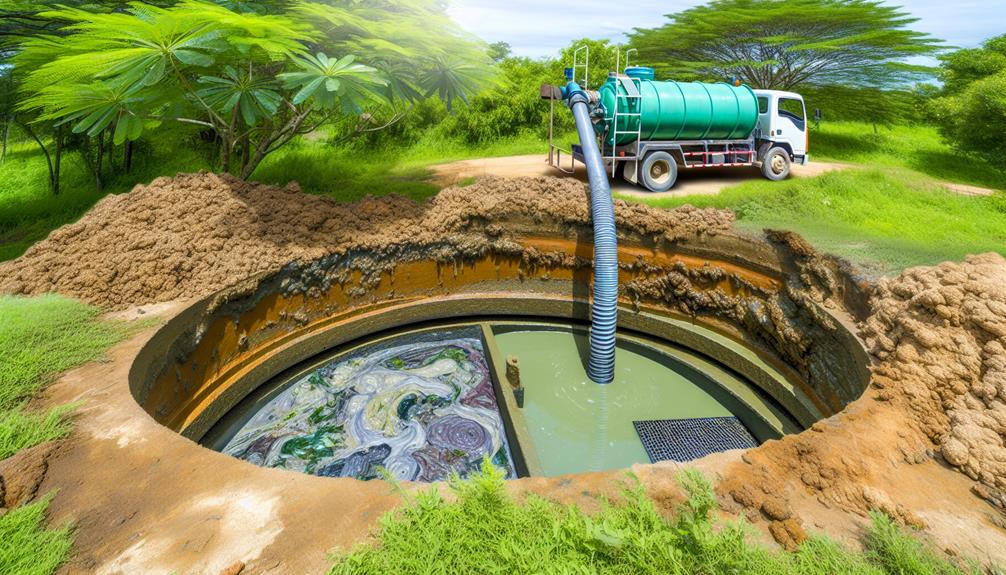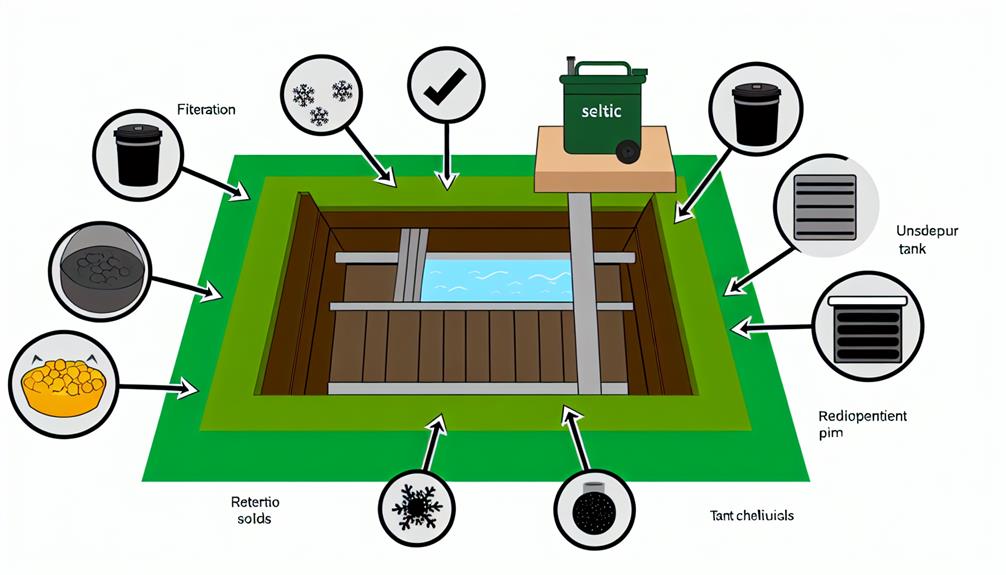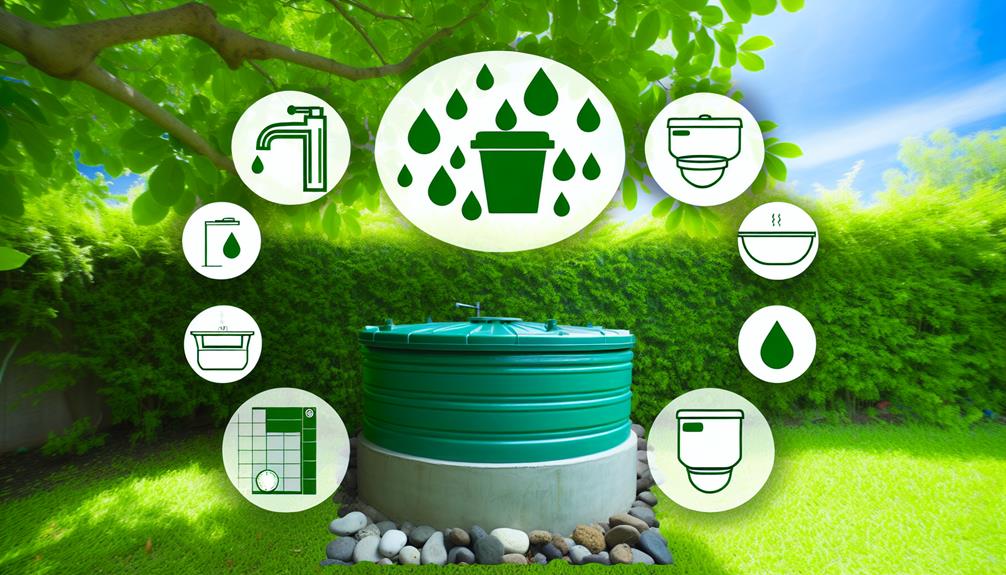Discover how to protect your septic system from breakdown with...
Read MoreYou & Your Septic Tank
What Are Top Septic Tank Maintenance Strategies?
Our professional septic service team offers comprehensive septic tank pumping services to keep your system running smoothly. Get a FREE Quote Today.

What Are Top Septic Tank Maintenance Strategies?
Just as the legendary Sisyphus had to continuously roll his boulder up a hill, you too might feel like maintaining your septic tank is an endless, uphill battle. But it doesn’t have to be that way.
With the right strategies and a little bit of knowledge, you can make sure your septic system runs smoothly for years to come. It’s about understanding the importance of regular inspections, pumping frequency, proper waste disposal, early problem detection, and water conservation measures.
So, are you ready to take the stress out of septic tank maintenance and keep things flowing smoothly?
Key Takeaways
- Regular septic tank pumping is crucial for preventing overflow or backups into the home and should be done every 3 to 5 years, or more frequently if there is substantial wastewater.
- Proper disposal techniques, such as avoiding flushing non-biodegradable items or harsh chemicals, and considering system upgrades can help preserve the functionality of the septic tank.
- Vigilance in identifying potential septic tank issues early, such as slow drains, bad odors, or vibrant vegetation, can prevent future headaches and costly repairs.
- Implementing water conservation measures, such as rainwater harvesting, greywater reuse, and installing water-saving fixtures, can safeguard the efficiency of the septic tank and reduce reliance on the system.
Understanding Septic Tank Pumping

To maintain a healthy septic system, it’s essential that you understand the ins and outs of septic tank pumping, a critical routine maintenance procedure. This process involves removing the sludge, scum, and effluent from your tank to prevent it from overflowing or backing up into your home.
Pumping costs can vary widely depending on the size of your tank, your location, and the complexity of the job. On average, you can expect to pay between $200 and $500 for a standard pumping service. However, neglecting this vital task can lead to much higher costs in the long run due to potential damage to your property or the environment.
Speaking of environmental impacts, proper septic tank maintenance plays a key role in protecting our natural resources. When a septic system fails, it can contaminate local soil and groundwater with harmful bacteria and other pollutants. Regular pumping helps to keep these contaminants in check, preserving the integrity of our ecosystems.
Regular Inspection and Pumping Frequency
Building on the importance of septic tank pumping, you’ll also need to understand the necessity of regular inspections and determining the right frequency for pumping your tank. Regular inspection and pumping are fundamental to the longevity and efficiency of your septic system.
Developing and adhering to inspection schedules can highlight issues before they escalate into significant problems. These inspections should be conducted by professionals equipped with the right pumping equipment. They’ll assess the overall health of your system, evaluate the sludge and scum levels, check for leaks and inspect the mechanical components.
The frequency of pumping depends on several factors, including the size of your tank, the number of people in your household, and the amount of wastewater generated. Generally, septic tanks should be pumped every three to five years. However, you may need to pump more frequently if your household generates a substantial amount of wastewater.
Ensure your pumping equipment is in optimal condition. Neglecting this can result in inefficient pumping, potentially harming your septic system. Regular maintenance of this equipment is as crucial as the inspection and pumping processes themselves.
Proper Disposal Techniques

Understanding the right disposal techniques is vital for preserving the functionality of your septic system. With the correct methods, you can prevent malfunctions and costly repairs, while also ensuring an eco-friendly waste management approach.
Here are four key disposal techniques to consider:
- Regular Drain Maintenance: Avoid flushing non-biodegradable items or harsh chemicals that can damage your system. Stick to water, human waste, and toilet paper for a healthy septic system.
- Disposal System Upgrades: Modernize your septic system with advanced technologies. These upgrades can enhance the performance and longevity of your system.
- Eco-Friendly Alternatives: Composting toilets or greywater systems are excellent alternatives that reduce water usage and waste production. These systems aren’t only environmentally friendly but also efficient in waste management.
- Professional Assessment: Engage professionals for regular inspections and guidance on proper waste disposal techniques. They can help identify potential issues and suggest preventive measures.
Identifying Potential Septic Issues
In maintaining your septic system, it’s crucial to be vigilant in identifying potential issues before they escalate into costly repairs. Warning Signs Identification is a key strategy you can employ to ensure the longevity of your system. Slow drains, persistent bad odors, or unusually vibrant vegetation near the drain field could indicate a problem. Paying attention to these signs can help you address issues early and prevent detrimental damage to your system.
Septic Tank Additives, while not a cure-all, can be useful in breaking down waste and maintaining system balance. However, they’re not a substitute for professional maintenance and should be used judiciously. Overuse of additives can lead to system imbalance and even failure.
If you notice a sudden increase in water usage or if your system hasn’t been serviced in over three years, it’s time to call a professional. An expert can provide a thorough inspection and pinpoint any potential problems, saving you from future headaches.
Implementing Water Conservation Measures

To safeguard your septic system’s efficiency, it’s essential that you implement water conservation measures throughout your home. By doing so, you’ll reduce the volume of water that enters your septic system, enhancing its longevity and performance.
Below are four effective strategies:
- Rainwater Harvesting: Collecting and storing rainwater for later use can significantly decrease your reliance on your septic system. This not only saves water but also reduces stress on your septic tank. You can use harvested rainwater for gardening, washing cars, or even flushing toilets.
- Greywater Reuse: Greywater, which comes from showers, sinks, and washing machines, can be recycled for non-drinking purposes. Reusing greywater can reduce the amount of water entering your septic system, promoting its efficiency.
- Install Water-Saving Fixtures: Low-flow toilets, showerheads, and faucets can drastically reduce your water consumption. These fixtures are cost-efficient and can help in prolonging the life of your septic system.
- Regular Maintenance: Regular inspections and pump-outs ensure your septic system operates at peak efficiency and can handle the water load effectively.
Frequently Asked Questions
What Is the Average Lifespan of a Septic Tank?
Your septic tank’s lifespan largely depends on its capacity and material durability. Generally, with proper care, it can last between 15 to 40 years. Concrete tanks last longer, often reaching the 40-year mark.
Are There Any Specific Regulations or Permits Needed for Septic Tank Maintenance?
Yes, you’ll need to comply with sanitary codes and acquire permits for septic tank maintenance. It’s vital you’re familiar with local regulations to avoid fines. Consult with a professional to navigate the permit acquisition process.
Does the Type of Soil in My Yard Affect My Septic Tank’s Performance?
Yes, your yard’s soil type significantly impacts your septic tank’s performance. Conduct soil testing to determine its percolation rates. Fast-draining soil may require a larger drain field, while slow-draining soil may cause backups.
How Can I Ensure That My Landscape Design Doesn’t Interfere With My Septic Tank?
To ensure your landscape design doesn’t interfere with your septic tank, consider plant selection and irrigation. Choose plants with shallow roots and set up your irrigation system away from the tank to avoid water overload.
Can Certain Weather Conditions Affect the Functioning of My Septic Tank?
Yes, certain weather conditions can affect your septic tank’s functioning. Extreme cold can cause freezing, while heavy rains may over-saturate the drain field. Ensuring weather resilience in your system is key to handling temperature effects.
Conclusion
So, you’ve become a septic tank guru, eh? You’ve mastered the art of regular inspections, pumping, and mindful disposal.
You’re even conserving water and nailing the early detection of any problems. Isn’t it ironic? All this effort, just to ensure something designed to deal with waste is in tip-top shape. But that’s the game, friend.
Keep up the good work and your septic tank will keep up its end of the bargain.
You may also like...
Why Are DIY Fixes Essential for Septic Tank Pumping?
Tap into the importance of DIY fixes for septic tank...
Read MoreUnveiling the Average Costs of Septic Tank Pumping
Master the mysteries of septic tank pumping costs and avoid...
Read More
The Best Septic Tank Pumping Services Near You

Answer Some Questions
Let us know about your needs so we can find you the right septic tank pros.

Get Quotes
We will put you in touch with the right septic tank pros for your job and location.

Hire Right
Compare quotes, message or call pros, and hire only when ready.



